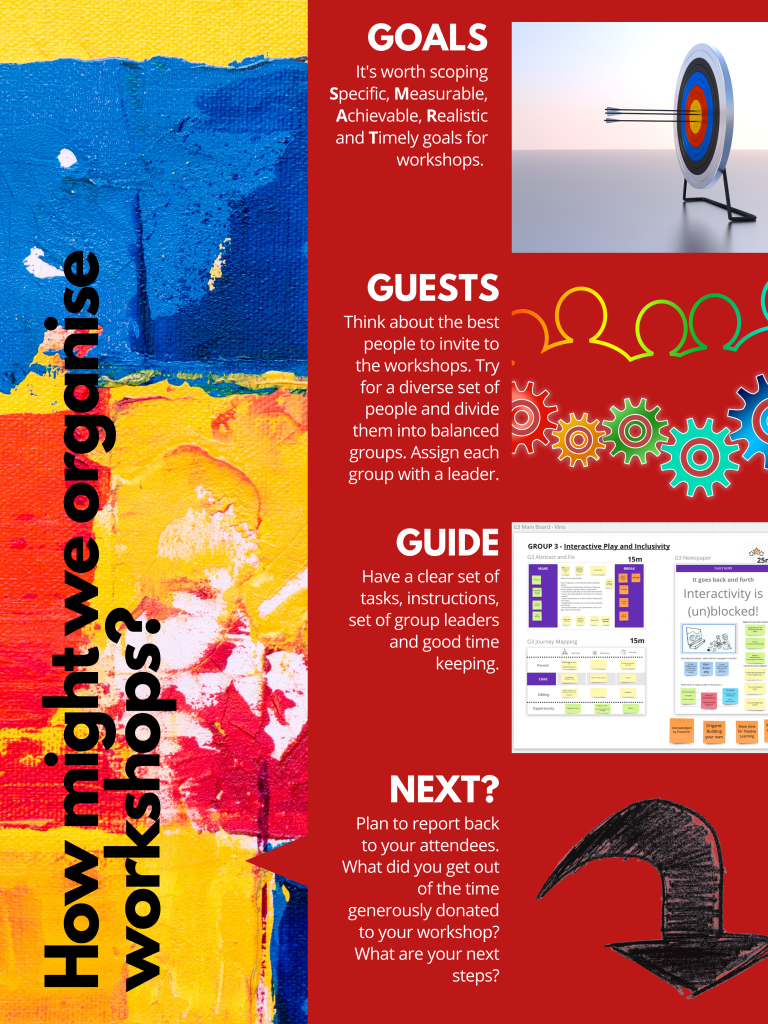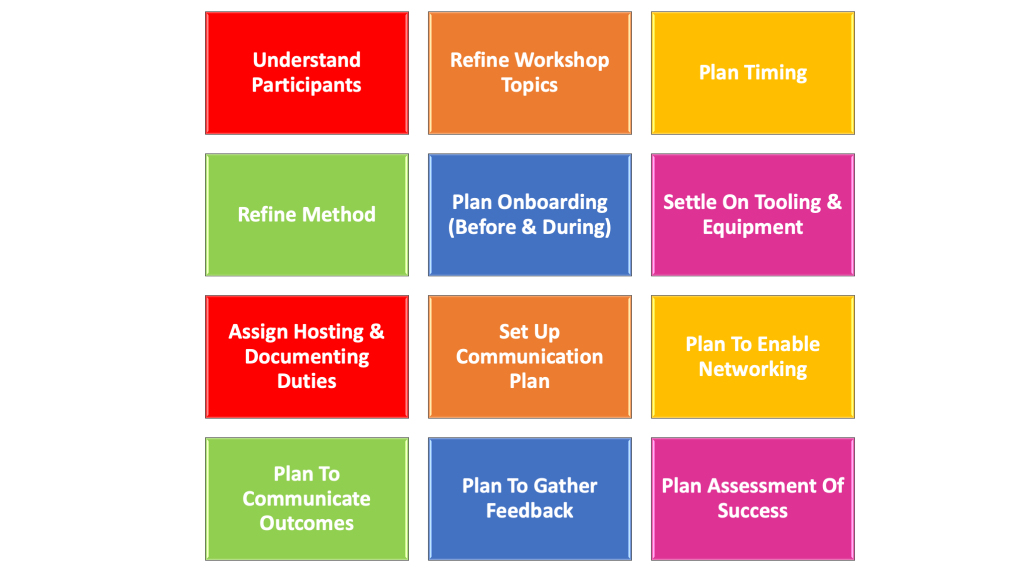Brief
Workshops are great way to bring together participants to brainstorm, learn together, network and focus on planning out how to solve specific problems. However, planning out the organisation, focus and goals of the workshop is critical to making it a success.
In general, I have found a seamless workshop experience is hugely improved through planning and enabling clear and concise communication at all levels – between organisers, between organiser-participant, and between participants. This helps keep the workshop running on time and is even more vital if the workshop is behing held online (virtual).
In collaboration with…
Colleagues in industry and academia with complimentary expertise.

Design Focus & Scope
The design questions in organising a successful workshop should include:
- Why organise a workshop?
- What the deliverables of the workshop entails?
- Where do you host the workshop?
- Who should participate in the workshop?
- How to go about achieving the why, what, where and who…
Why?
It’s good practice to have a clear idea of why it was necessary to come together for a workshop in order to design an optimal experience and get the best chance to achieve results.
Often in-house workshops can be used to tackle the potential use cases of a specific blue sky idea – ‘How can content makers, in Sports, innovate the big screen experience?‘. Within R&D in media, an emerging technology stack or a concept can be stretched to fit better into a product or service if a practical context/lens is applied to it. Organising a workshop with content makers or creative directors in addition to technologists and engineers can help define and develop diverse use cases. In order to futher limit the scope of the workshop theme, it’s a good idea to attach a plausible context, time frame to bring the idea to market and perhaps additional constraints such as practical integration into the current state of art or organisational behaviour.
In addition, to bringing a sense of practicality to R&D ideas, it is also important to continously feed the discovery phase of next generation experiences. Working with industry partners and academic colleagues to organise and host collaborative workshops is a good way to push boundaries and uncover the next research project. Workshops in the discovery phase can look at wide subject proposal such as ‘Exploring and Enhancing the User Experience for Television‘ or a more focused research topic such as ‘Social VR: A New Medium for Remote Communication and Collaboration‘.
What?
It’s vital that all organisers and stakeholders are briefed and on the same page in their understanding of the deliverables of the workshop.
The definition of goals can be as specific or as exploratory as needed, however, they need to be ‘written’ down and agreed on. For instance, in trying to discover the potential of an emerging concept (connected TVs), there is mileage in consulting with the wider research community to build a cohesive understanding of what experts in the same field but from a different organisation bring to a discussion – as was the case in our CHI 2013 workshop on ‘Exploring and Enhancing the User Experience for Television‘. The aim was to get feedback from the community to build confidence in our ideas and get an understanding of the methods that can be used to prioritise the ideas.
Where?
Prior to the pandemic, logistics, associated venue and facilities were the main items to consider in deciding where to host a workshop. For instance, co-hosting a workshop in association with the prestigous international CHI conference afforded a good chance of attracting world class human computer interaction experts to the workshop. It was also a good way to ensure logistics, facilities and accessiblity issues were taken care of by the main conference. Another international but smaller and more focused conference, IMX, was a good venue to run workshops focused on media and the TV. In 2020, the conference (and associated workshops) went virtual. As a result, in addition to a workshop on ‘Toys and the TV: Serious Play‘ in which I could work with colleagues who were experts in relevant fields, I could tackle the important aspect of improving diversity of participation in conferences and workshops.
The pandemic meant that all workshops had to be hosted online. Hosting a workshop online (virtually) afforded a lot of advantages to do with economics, sustainablity, diversity and inclusion even if the act of an in person face to face network building activity was missed. Going virtual also affords organisers the option to think of different platforms on which to host workshops in a fun, engaging way. Organisers can also collect objective data (positional data for instance) in addition to subjective feedback during the workshop (with consent of course). The ‘Social VR: A New Medium for Remote Communication and Collaboration‘ workshops (2020 & 2021) were both instrumented in such a fashion. Data from the 2020 workshop was used in some interesting research and published as a peer-reviewed full paper in CHI 2021.
Who?
Traditionally, in a workshop designed for a specific group of participants, it is a good idea to get to know the needs and skills level of the participants in order to design the support they will need during the workshop. However, in research workshops, the focus is in inviting or attracting the right mix of people with complimentary expertise and diverse perspective in order to encourage a lively discussion.
In addition, to choosing an interesting venue and inviting colleagues who might have interesting contibutions to the workshop, it is important to issue a call for participation (cfp) and advertise the cfp over a variety of channels in order to attract (and potentially encourage) a diverse set of participants. A good cfp focuses on a theme, sub-topics and purpose amongst other pieces of information. Additionally, if the cfp is looking to attract industry experts, students and established academics, as we did in the workshop on ‘Toys and the TV: Serious Play‘, it is a good idea to make the barrier to expression of interest as low as possible and give as much information on the type of challenges that are of interest to the organisers.
How?
There are multiple things that need to be planned out before the workshop including how to ‘recruit’ and engage participants before the workshop all the way to communicating what they managed to achieve back to them after the workshop.

Knowledge about the participants (both expertise and skills gaps) should feed into the design of the workshop and the support assembled to accompany it. In addition to resources and the right tools to use during the workshop, it’s important to plan for unexpected events (or interesting diversions) and allocate sufficient time to ‘complete’ all the planned activities in the workshop agenda. Coffee breaks, familirisation sessions, setting the ‘rules of conduct/engagement’ for instance, are even more important in virtual workshops and as are ice breakers and network building facilities.
Summarising & Reflection
Workshops can range from a set of paper presentations, where every participant is given a chance to share thought provoking ideas, all the way to an activity filled experience, where participants are allowed to build on each others ideas and brainstorm possiblities that inspire everyone. As much fun as planning and executing a workshop can be, it is important for organisers to get together to debrief, summarise and reflect on where to go next once the workshop is done. If possible, communicating the summary to participants is a nice touch especially if the workshop is a part of an ongoing project or if the workshop acted as a targetted networking activity.
PS:
It’s easy to forget taking image in virtual workshops even though it’s easier to do so. Take images, if not for the memories, for the documentation of the workshop.

You must be logged in to post a comment.